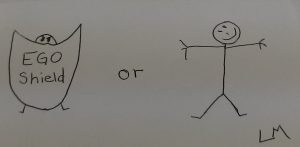Welcome back! Thank-you for returning or for finding me for the first time. Since we’re still in the introductory stages of our conversation, I’d like to discuss just a little more about gaining understanding and compassion. Our goal, ultimately, is to improve our world by bringing about positive change.
You will find that I am including myself as a participant in looking inward throughout these conversations. While I have a certain knowledge about building bridges of understanding, it is an ongoing process to learn more ways and apply them to myself. I am not wanting to preach. I prefer a conversation about how WE, or all of us, can participate in bettering our world.
Last week I introduced a term you might not be familiar with: The Ego Shield. Ego is the sense of who we are. Generally, when people refer to ego it has negative implications. For example, a person with a big ego has issues around their own self-importance. They may be boastful or push people around. A person with their Ego Shield up has a difficult time hearing others. This is partially because their ego is so fragile that if someone presents something to them that is contrary to what they believe, there is a threat to their identity, their sense of who they are.
One way we can get through the Ego Shield of these people is to first look at ourselves. Do we bear an Ego Shield ourselves? Do we listen to others’ opinions and the reasons for why they believe as they do? Or while the other person is speaking are we thinking of the next thing WE want to say while dismissing the points our conversation partner is making? Do we tell them that they are wrong? Or do we validate their viewpoint, therefore validating the other person?
But what if we feel they are wrong? Isn’t validating the same thing as telling the other person that they are right, even if we “know” they are NOT right? Again, to overcome this dilemma we need to throw aside our own Ego Shield. Sometimes we “know” something and end up being wrong ourselves. This we must admit. For me, I find something I thought I “knew” is actually wrong daily. Humility in admitting when we’re wrong is a virtue that draws others to us. Keeping up the Ego Shield pushes them away.
Back to validation of our conversation partner. You might ask, if we validate the other person doesn’t it mean that we’re saying that we ourselves are wrong? No. This is a fear-based illusion. Validating someone will not take anything from us. It will not deplete us. And validating someone is not the same thing as saying we are wrong and that they are right. It simply means we acknowledge their experience and their own understanding of their experience.
We need to remember that the opinion held by the other person is the best conclusion they could arrive at based on their experiences and understanding of their own interactions with the world. It doesn’t mean they are right or wrong. It is just how things are for them. It’s probably not that way for us but it is that way for them.

Likewise, this same principle applies to us as individuals as well. Our viewpoints are also based on our interaction with the world around us, our experiences, and the way we understand things. It also doesn’t mean we are right or wrong. We need to remember that our way of seeing things is just ONE way of understanding out of however many billions of people there are on earth. Out of billions of people, how could MY opinion be the only correct one? Chances are good that it isn’t. We need to get rid of the Ego Shield and embrace, with excitement, the variety of viewpoints in our world!
Validating another doesn’t take anything from us. After considering the many billions of people on the earth, it is not far-fetched to consider that we are both probably wrong anyway. What is the harm in telling someone, “I totally understand why you would think that!” Or, “I’ve never looked at it that way but now that you explained it, it sure makes sense!” Does that mean that we have changed our opinion? No. It just means that we have taken the time to listen to and validate another person.
Here’s a small example. A teenager is caught stealing a pre-wrapped sandwich at the deli. Stealing is wrong! No matter what! Call the cops! But if you have the chance to go to the teen’s house and you see there is no food in the cupboard, the parent of the family is disabled, and there is obvious poverty. Does that change your opinion about stealing being wrong? No. Stealing is still wrong. However, you might be able to develop compassion for the teen who didn’t know what else to do because he was hungry and poor. There have been store owners who have caught people in this situation and instead of calling police, they have done something to help the family. What a different outcome for someone in that situation when another person took the time to validate them.
Again, validating a person’s opinion (or actions in the example above) doesn’t mean that one of you is right or wrong. Validating facilitates communication and says to the other person, “I understand your humanness and your interactions with the world.” It tells the other that we can see why they have the opinions and have made the choices that they have.
To get to the place where others will open and share their humanness with us, we also must share our own humanness. Being human, sharing our well-thought-out opinions and choices, with someone else takes vulnerability because we might be judged, and our identity is at stake. People put up their Ego Shield to protect themselves from this possible attack on their identity. Unfortunately, or maybe fortunately, there’s little room for growth without being vulnerable to the chance that our opinions and choices are wrong.
We can break down more barriers if we can admit that we simply don’t know. Because it is only when we admit that we don’t know that an entire world of possible answers become available to us. Imagine the Ego Shield in front of your body. What happens when you drop the shield? You are open to everything! You might get hit by something! You might see amazing vistas that the shield was blocking! Your hands are free from holding it! Without the Ego Shield, suddenly ALL possibilities are open!

When we insist that we know something, then we close ourselves off to most other possibilities. Admitting that we don’t know is a powerful way to gain understanding. And we might be surprised what answers and possibilities come to us. To demonstrate, in the stolen sandwich example above, instead of just saying, “Call the police!” We could ask, “Why would that teen do something like that?” See how admitting that we don’t know makes a difference? Once we open ourselves up to learn more about a person’s circumstances, only then can we make the most appropriate reactions and responses toward a person’s choices. This concept is revered in the U.S. Constitution. It is called “due process.” It is a concept that can bring civility to our communities if we each practice it individually.
The change starts with each of us. I invite you to drop your Ego Shield with me. When we each look within ourselves and take down the Ego Shield, we will begin to listen to and validate each other. We will acknowledge each other’s humanness. Yes, dropping the Ego Shield will make us vulnerable. But, vulnerability will open us to more sharing communications. Only at that point we can begin to collaborate on real solutions. But good, honest, fair solutions do not happen with our Ego Shields separating us in fear.


Leave a Reply